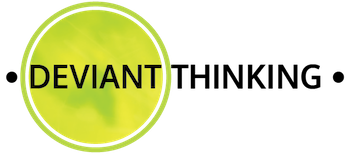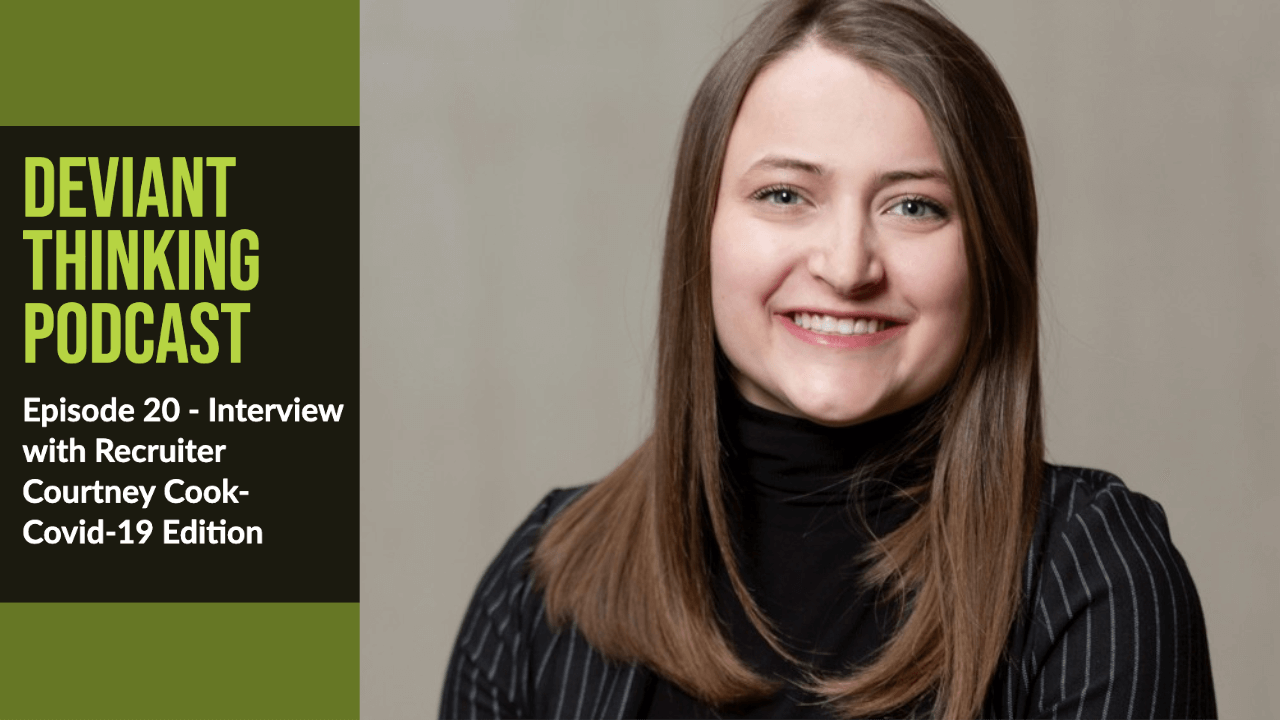CLICK HERE TO DOWNLOAD THE TRANSCRIPT (PDF VERSION) Jennifer Thompson 00:00 Welcome back to The…
CLICK HERE TO DOWNLOAD THE TRANSCRIPT (PDF VERSION)
Jennifer Thompson 00:00
Welcome back to The Deviant Thinking podcast. I’m your host, Jennifer Thompson
and today and always will explore career advice that breaks the rules. So I’m excited today I have with me Courtney Cook. She is a talent sourcing partner at Open Systems Technology in the Minneapolis St. Paul area. Courtney welcome to the Deviant Thinking podcast, I would love to start out why don’t you tell some folks about what you do and a little bit about your organization.
Courtney Cook 00:30
I am currently a talent sourcing partner at Open Systems Technologies OST for short, and really what we do is we’re a software consultancy, so we have a wide variety of different IP service offerings, but kind of what we’re known for in the market, what our niches is working with connected products and IOT solutions. So there’s a very strong emphasis on like product development and product design. So within the organization. I’m kind of responsible for reaching out to talented folks within the Minneapolis market but also both the Grand Rapids in Detroit market as well, because we do have offices there for our roles that are hard to fill or we’re not getting applicants for.
Jennifer Thompson 01:19
Awesome. Well, that sounds great. Well, Courtney, one of the reasons I reached out to you to chat was you had posted something up on LinkedIn talking about everything that was going on with COVID and that you are still looking to chat with people now. And that there might not be roles now but could be in the future. So tell me a little bit about what’s kind of going on with with all this COVID stuff and and how you see see people responding to it.
Courtney Cook 01:48
Within the community. I’ve definitely seen an overwhelming show support from one another which is really refreshing to see. It does seem like the community He’s really stepping up to help one another out. And obviously, you know, most companies are in a hiring role right now to where they’re either laying off people or they’re just kind of in a hiring freeze until, you know things with the Coronavirus settle down a little bit. So it’s definitely an interesting market right now. It is it is a hard market. If you are currently a job seeker, or if you did just get laid off. There’s a lot of uncertainty. So what I’ve kind of noticed within the market is there seems to be a lot of contractors who recently got laid off of their projects that seemed to kind of be the first wave of where companies started cutting people. And now we’re kind of seeing waves of a lot of ad agencies are doing mass layoffs and of course, other industries are affected as well. But specifically within Minneapolis, I’ve noticed there’s an overwhelming amount of people within the marketing SEO space, looking for work.
Jennifer Thompson 03:09
Interesting. So as everybody is now stuck at home, I know you are working from home today as I am as we’re all stuck at home. So we have a little more time on our hands. Have you been giving out any advice to folks have now that they have a little more time on their hands? What should they be preparing? As things move forward so that when we get restrictions lifted and things like that, that they’re ready for what what’s available in the job market?
Courtney Cook 03:39
Yeah, I think a lot of people right now are getting a little discouraged, which is the amount of roles that are out there to apply for. So I think now is a good time to definitely freshen up on your professional skills. If there’s any sort of courses that you can take online. Those are great to add to Your resume and shows that you’re still working on things during this downtime. What a lot of people I think are, are out there right now are getting a little discouraged with what they’re seeing in the market. But now is a good time to really connect. Because even though a lot of companies are in a hiring freeze,
a lot of companies are pipelining for when they are planning to hire again, typically, the hiring process can take, you know, anywhere from a month, to even a whole year to fill some roles. So companies know that those hard to fill roles are still on the way and their next hire maybe six months out, continue to apply for things but also continue to have conversations with people even if they’re not hiring. The more you network, the more you kind of get your name out there and the more people you connect with, you never know when opportunities are gonna arise in the future.
Jennifer Thompson 04:57
Great, that sounds like absolutely great advice. And I noticed when you posted some things on on LinkedIn, you asked for people to to reach out to you through LinkedIn or through email. What, what when someone reaches out that way? How did they approach you? Like what? What’s a good approach for them? And how do they stand out so that they’re memorable because if you’re not hiring for six months, they want they need to be memorable so that six months from now, they’ll be top of mind for you.
Courtney Cook 05:27
I know during this time, especially like when a recruiter talks to you, they’re really looking for what your sweet spot is, where your skills are, and where you’re going to be happy in the future. And I think a lot of times candidates will sell themselves short on things or say that they’re open to too much. If a recruiter asks you what types of roles are you open to? If you’re targeting a marketing role, say you’re looking for marketing roles. Don’t say, you know, oh, I’m looking for marketing could be advertising, looking for sales looking for this and that and that, be specific with what you’re looking for. And that’s what I will remember you for. If you’re very overgeneralize with your answers and your skills, then it can be, you can kind of get lost in the mix. But one way to stand out from the crowd is to be sure of what you are looking for what you want within your next role. And really, now is a good time to kind of do that digging and searching to really be as specific as you possibly can.
Jennifer Thompson 06:33
I think that sounds like great advice. A few weeks ago on the podcast, we had a gentleman his name is Pim de Morree from the Corporate Rebels, and he talked a little bit about a similar thing. Did you know that it’s like over 38% of the people in the marketplace are not actually doing jobs that are their greatest strengths and they’re their best Yeah, that’s
Courtney Cook 06:56
Yeah, I didn’t I didn’t know that statistic. But that definitely It does not surprise me.
Jennifer Thompson 07:01
Yeah. So really telling people what what you’re good at as an individual really does count and declaring that, because I always find that if they, right, that’s where the magic happens if you can find what they’re good at, and it matches what you need. That’s, that’s the sweet spot.
Courtney Cook 07:19
Exactly.
Jennifer Thompson 07:20
Great. And so as they reach out to you, Is there ever a time that you don’t want to hear from somebody?
Courtney Cook 07:26
That’s a good question. And it really, I would say no, because even if OST ourselves are not hiring, I’d like to help out. I’m very well connected throughout the Minneapolis market at least, and even a little bit in you know, the Michigan market as well. So, even if I may not have a role for you, I at least would like to, you know, take a five minute conversation to learn a little bit more about what you’re looking for. Just so when that opportunity arises, or I see post on LinkedIn from one of my connections who’s looking for something I know who’s named a comment. Typically, I would say I’m more likely to help if you’re in the IT market just because that’s where I’m more tuned into. But I would say, you know, don’t ever hesitate to reach out. I mean, if that goes to any recruiters because worst case scenario, they’re just not going to respond. It’s not something I would do, but it’s always good to put yourself out there and I think most recruiters just appreciate anybody who can reach out.
Jennifer Thompson 08:35
That’s great advice as well. I I have so many clients who get nervous about reaching out to a recruiter because I don’t want to bother them. Any comment on that?
Courtney Cook 08:47
Yeah, I think a lot of people think that that they’re taking up my time by me talking with them, but the a lot of them don’t realize this is my job. You know, I love talking to people and even if I’m not able to necessarily connect you to the role and you think I’m wasting your time, I guarantee you I learned something about the market within our conversation. And my job as a recruiter is to know what’s going on within the market and to know, just learn new information. So even if you think that you’re wasting recruiters time, there’s little nuggets of information that I take from every single conversation I have that it really is invaluable. And you don’t get that any other way than talking to people and connecting with people.
Jennifer Thompson 09:32
All right, so I’m going to switch gears a little bit on you, Courtney, as we talk about these roles that you have available have had available and that you hire for regularly. I’m really curious, you know, obviously a lot of resumes come across your desk, a lot of connections and so on. Is there any that have really stood out to you and have really gotten your attention Can you kind of share of course with About disclosing any personal information or anything, but kind of share what what made them stand out?
Courtney Cook 10:06
Yeah, I would say the top advice I could give to anybody is put your accomplishments on your resume. Put them right front and center. I a lot of people, I think just like to stick with the standard bulleted of, okay, this is kind of what I did on a day to day basis. And then they think they’re going to save the accomplishments for the conversation of when they get to the recruiter, then they’ll start kind of bringing up some of their accomplishments. You can absolutely 100% list your accomplishments on your resume and you should, with every single role, you know, you likely had a major accomplishment list it lists all of your accomplishments because those are the selling pieces. Those are the pieces that do stand out. And then also beyond that, I would say I think a lot of people shy away from listing their community involvement on their resume, but that’s something that I know, OST likes to look for. They like looking for people who are overall well rounded and are servant leaders within the community, you know, volunteer, maybe they they coach, a sports team or things like that. I think a lot of people are like, Oh, well, it’s not really related to the role, and they just don’t think to list it on their resume. But companies like to see that because they want to see what you do outside of work as well.
Jennifer Thompson 11:27
That sounds really interesting. And and I do encourage them clients to do that occasionally. But now hearing you say that, I will definitely will do that, even more. So because I always say if they’re doing it for free, like that work in a lot of ways almost counts more, because they’re just putting in their efforts. You know, if they serve on a board, if they help an organization out if they coach if any of those things. There’s a lot of value to that.
Courtney Cook 11:53
Absolutely. Absolutely. And I think a lot of people sell themselves short on their resume and they think it’s not related to The work that they do, but really, it just shows that you go above and beyond to, you know, serve your community. So those are just traits that I know OST specifically looks for, but I know a lot of employers out there are the same way.
Jennifer Thompson 12:16
Great, great. So okay, so someone gets a resume to your desk? Do you typically do a phone conversation with them? Like what’s kind of usually the next steps?
Courtney Cook 12:26
Yeah. So typically, I am kind of the first call that you would have with OST. And really what I’m looking for in that first initial call, some basic pieces of information, really kind of trying to dive in and learn just more specifically about what you’re looking for as a candidate. Because if what you’re looking for as a candidate matches what the role is, then I think it would be good to pass you along to the hiring manager. Usually that first initial call is pretty, you know, low key, very conversational, and 30 minutes long. So it’s usually talking with a recruiter is nothing to be, you know, worried about. You know, we’re really just trying to dive in and learn about what you’re looking for.
Jennifer Thompson 13:14
Great advice there because it is it’s supposed to be a conversation, right people, it has to be a bit in both directions. I assume it’s also an opportunity for them to learn a little bit more about your organization.
Courtney Cook 13:25
Exactly, exactly. Yeah. And then I mean, in that initial call, I do give an overview of, obviously, what OST does as a company, the types of work that we typically do, but also overall of the role, and, and also some of the benefits and whatnot of working with OST. Really, I would say most of the conversation is framed around, you know, what’s your experience and digging in a little bit more on that.
Jennifer Thompson 13:53
Great. So what’s your favorite question to ask?
Courtney Cook 13:56
Hmm, well, that’s it that’s a that’s a good one, I would say my favorite question, favorite question to ask is, what are the three main things that you are looking for within your next role? Because that answer is typically, it shows a lot of what will you know, they’ll say, Oh, well, I’m looking for this, because at my current company, we have this, this and this. And oh, I’m really looking for a company that supports learning because I’ve been wanting to go back and get my master’s degree for this long. And, you know, it just brings up some areas that you don’t necessarily get to see on a resume, which I really liked that and then once somebody tells me what the three thing, main things that they are looking for, within their next role, I asked them three reasons why that is important to them. And typically, that question is just very telling of who the person is, and you know if they would be a fit within our culture as well.
Jennifer Thompson 14:58
I love it. I think I love that your focus, Courtney’s so much on on what that person wants, I think OST must be very privileged to have you because you you probably recruit really great people because it is kind of again that magic if it if it fits in in both directions there for sure. Exactly. This has been absolutely fabulous. I guess kind of my my last question would be, again, like on that standing out and being remarkable. What What’s your biggest piece of advice? You know, you said the the accomplishments for sure, but like, what’s what’s the most daring that someone should be or could be to get your attention?
Courtney Cook 15:48
Daring? Hmm. Yeah. So I guess I mean, I’ve seen some very creative things. I would say honestly, there’s nothing that’s too bold unless it’s comes across as rude or offensive. I think if what you are coming like if what you’re planning to do, I’m trying to think of different ways people have kind of jazz things up in the past, whether they included a video of themselves doing the sales call for a sales role or things like that. I think most recruiters really appreciate the extra effort that goes into it. And as long as you’re not doing something, like randomly showing up to the office, and, you know, just like random stuff like that, you know, as long as you’re being conscious of other people’s time, and other people’s, you know, being respectful, then I don’t think there’s anything that’s necessarily too bold.
Jennifer Thompson 16:44
I love that and I love your idea. Yes, a recording of a sales call. You know, maybe a portfolio work that normally doesn’t require our portfolio you know, someone who’s an engineer showing you a portfolio of work, things like That I am with you, I have yet to see anything too bold or things that have been not appreciated, especially by a great company, they’re going to love when people go above and beyond.
Courtney Cook 17:11
I agree. I agree. And that’s where it’s like, as long as you’re being respectful and you know, conscious of other people, I really don’t think there’s anything too bold you could throw out there. And I another thing, like, I know a lot of people another thing that kind of sets them apart is they’ll include like, some of their personality traits or some assessments that they have done. Those things are also nice to see too. And a lot of people might think those are bold, but you know, it’s always different ways to differentiate yourself.
Jennifer Thompson 17:45
So as you say that what comes to mind as you always like to ask this question, how many pages for resume?
Courtney Cook 17:54
Oh, well, I know a lot of people think in the market that resume should be one page. And a lot of people think that a resume should not have a limit. And I think that both of those people are wrong. Okay. I think that, you know, definitely, there is a point to if your resume is 11 pages long, you’re, nobody is going to read that word for word, or even if they did read it word for word, they’re not going to ingest that information in a way that’s beneficial to you, they’re not going to remember it. So I would say, Be conscious of what you’re putting on there. Don’t just throw anything on there. I mean, if it adds value, your skill set or shows an accomplishment, or really highlights the work that you have been doing, then included on the resume, but if it’s just things like, I don’t know, like I see, like almost every single resume puts that they are proficient in Excel, if the role does not require you to be proficient in Excel, don’t include it on there. So things like that. But I would say kind of the sweet spot for a resume, obviously, it depends on, you know, your level of experience. But I would keep it around, you know, two to three pages.
Jennifer Thompson 19:15
That’s great to hear, because most of the folks, and you and I talked about this online offline a little bit, but most of the folks that I work with are in that, you know, 15 plus years of experience, and that’s also kind of the area that you’ve recruited to. And it’s hard for them to fit it on that one page for sure.
Courtney Cook 19:34
Oh, yeah. Well, I made themselves short if they did,
Jennifer Thompson 19:39
Absolutely. So we want to make sure they have enough out there, but definitely not that it goes on forever. Okay. So I think I said that was my last question, but I guess I do one more question. Yeah. So right. The rumor is that a recruiter only looks at a resume for six seconds. One. What do you think of that? Can you speak on a resume in six seconds, or do you take more time than that, to really look at who someone is,
Courtney Cook 20:07
I can say there has been resumes that I’ve looked at for six seconds and stopped looking at, but I wouldn’t say on average. That is the amount of time I spent on a resume. I think there’s sometimes some some red flags that you can immediately catch on when looking at a resume. So that can sometimes make it a little quicker. If I catch something. You know, that’s just not a fit for the role, then it’s pretty easy to filter through who’s not a fit. But I would say, typically, if somebody applies in they have their general experience matches the skill set of their role. I mean, I can spend upwards of, you know, six minutes looking through a resume.
Jennifer Thompson 20:52
Awesome, well, good. I’m glad to hear that too. Because I wouldn’t want all of these folks to do tons of work and then not not get seen? So that’s an important.
Courtney Cook 21:01
Exactly. And I will say, when I am looking at a resume, I typically that the very next place I look is your LinkedIn profile. LinkedIn profiles are becoming the new resume. So if you I mean, that is definitely another area to invest on updating, if you have some downtime right now.
Jennifer Thompson 21:24
Well, that is wonderful advice as well. So you keep coming up with good points. So I keep having new questions here. So on the LinkedIn profile, just out of curiosity, what do you think of the recommendations section? How valid is that for you?
Courtney Cook 21:40
I love when somebody has a bunch of recommendations. I mean, that just makes me feel doubt like validated as a recruiter, if I’m going to present somebody the hiring manager, I want that hiring manager to be you know, happy with the candidate that I give them. And I want them to be like, great, that was it. That was, you know, an excellent find when we see those recommendations given on a profile, it just kind of reaffirms what we already believe that you’d be a good fit for the role. definitely reach out to your network. If there’s anybody that you have worked closely with, that you think will give you a recommendation, definitely reach out. But I think the best way to get recommendations is to give them so go through everybody that you’ve worked with in the past 15 years. And if there’s anybody that kind of stands out, give them a recommendation, because after reading the recommendation that you’ve given them, they’ll likely want to give one back to you.
Jennifer Thompson 22:38
That is great advice. And I would add, it shows a lot about the person giving the recommendations that they were thoughtful and kind and cared about others to take that time and recommend others. So it says much about them, as it does about the person they’re recommending.
Courtney Cook 22:58
I agree. I agree.
Jennifer Thompson 23:01
Well, absolutely wonderful. Well, Courtney, this was an absolutely fabulous talk today, I am thrilled that you were able to make the time to to meet with me. Is there anything else that you would like to, to say to all of these folks out there who are sitting at home dealing with the COVID situation?
Courtney Cook 23:23
Yeah. Well, I guess, during this time, I mean, with unemployment rates, you know, getting almost as high as like 10%. In the United States. I think a lot of people are getting a little hopeless right now. And I would say now is, especially with you know, all the stay at home orders and everything. Now is the time to really work on yourself professionally, work on you know, updating that LinkedIn profile, work on updating any skills, if there’s any certifications that you can get that would help excel you in your career work on those right now, but mainly, get connected. Reach out to people on LinkedIn. You know, feel free to reach out to me, you know, every person that you talk to know somebody that’s hiring somebody. So the more you can kind of get your name out there, the more you can talk to people, the better luck you will have in finding that, you know, next career step that’s good for you.
Jennifer Thompson 24:18
Fabulous. Well, Courtney, thank you so much for being on the Deviant Thinking podcast, and you stay safe.
Courtney Cook 24:26
Thank you for having me, Jennifer, you too.
Jennifer Thompson 24:29
Well, that was a fabulous interview with Courtney Cook and she had some great advice for today. One of which, which I promise you all I did not pepper her to say this prior but she talked about your LinkedIn profile. And for the month of April, I am offering my LinkedIn program that helps you to update your profile. It helps you get recommendations, all kinds of great tips and tricks to get that LinkedIn profile ready. I’m offering it for the month of April for just $9.99 instead of my regular $49 price, so head on over to the DeviantThinking.com website and check that out and I’ll link directly to that in the show notes as well.
Well, I hope you enjoyed today’s podcast. I think Courtney shared some amazing information with us and really timely and really relevant with all that we have going on in the world. If you’ve enjoyed this podcast, please take a moment and head on over to iTunes and give us a great review. Those reviews really do mean the world to us. Until next week, stay safe and be deviant




